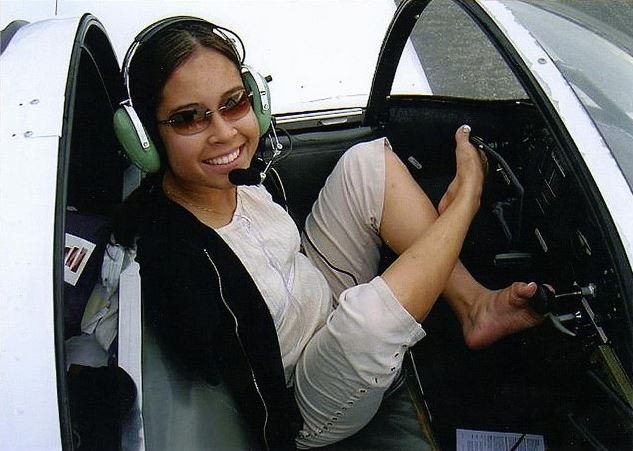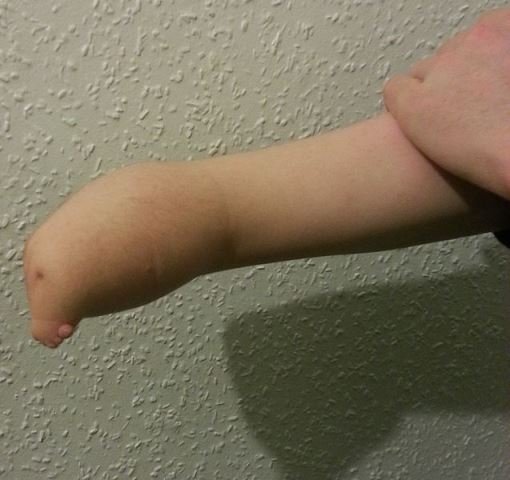In life, some achievements by our fellow earthlings can pass for some of the greatest achievements in the world. But then, we do have records and achievements that get set and get broken as well.
But then, through extraordinary feats of bravery and determination we often hear and discover considerably astonishing feats being achieved by even the less privileged and handicapped around us. Such is the case of the relatively famous “armless pilot”.

Overtime and through research, I can’t help but get fascinated by the increasing number of achievers in our time and age. Both popular and unpopular, we keep discovering so many people that, despite limitations, have made incredible achievements that sometimes beat human logic and comprehension.
A case of such a special earthling with an astonishing level of determination and sheer will would be Jessica Cox.
Who is Jessica Cox?
Jessica Cox is a 35-year old American who became the first licensed armless pilot in the world back in 2008. (Yup! Real talk, no gimmicks…...an armless pilot)
The armless Jessica Cox, who was born with a strange birth defect that left her with no arms, can fly an airplane with her legs….. (And I thought I was an over-achiever? Lolz)
The talented Ms Cox who is from Tuscon, Arizona, USA, is also a SCUBA diver, a double black-belt holder in Taekwondo and an armless surfer – all of which she has achieved with no arms. (Damn! Talk about an achiever)
The 35-year old, graduated in 2005 from the University of Arizona with a bachelor’s degree in psychology and a minor in communications. The multi-talent can;
- type (25 words per minute)
- write
- brush her hair
- remove and put in her contact lenses
- drive a car
- pump her own gas
- and fly a goddamn airplane
…by simply using her feet.
She first flew a single engine airplane via Wright Flight in 2005, and earned her pilot’s certificate on October 10, 2008 following a three years training period through an Able Flight scholarship and was under the tutelage of Parrish Traweek. Cox also is qualified, with arms, to can fly a light-sport aircraft to an altitude of 10,000 feet.
Cox’s love for martial arts, even without having arms began when she was only 10 years old. She trained in taekwondo at a school in her home town. She attained her first black belt at the age of 14, and while she attended college at the University of Arizona, she underwent her taekwondo training on campus at the American Taekwondo Association club.
Instructors had to create a modified training curriculum from the standard American Taekwondo Association material to aid the future of students without the use of their arms.
Inspiring quotes from Ms Cox include:
"I never say, 'I can't do that'. I just say, 'I haven't worked it out yet."
"I was born this way so I've just learned to adapt."
"When I was born my parents were shocked. But they never made me feel like I was any different."
"Other people always stared at me or made comments but I turned negative feelings into something positive. It's made me very driven."
On flying? "Most people were encouraging - but some thought I was taking a dangerous risk. I had to be very determined and persistent."
"There are so many ways that disabilities can make people believe that they 'can't' achieve their dreams, but I'm evidence that you can."
Jessica Cox, who still has rock-climbing as one of the things on her list she would like to achieve, had at one point said the only thing she was afraid of was flying.
But after several encouragements from a fighter pilot, and three hard years of training (for the usual six months required), with 89 hours of practiced flying in a light Ercoupe aircraft where only hands were needed for controlling it instead of both hands and feet, she completed her lightweight aircraft license.
Jessica Cox now a certified and qualified armless-pilot is now training to become an instructor in order to aid and encourage disabled people to learn to fly as well.
Possible medical condition responsible for her deformity
There are several birth defects or medical conditions that are linked to deformities in babies when they are born.
Ever heard the term Amelia? Well, truth be told, at first glance, you might consider the term or word “Amelia” to be a cute baby name or just a cute feminine name. But guess again, Amelia or Tetra-amelia syndrome is also the name for one of the rare medical conditions that results in the absence of one or more limbs of an infant at birth. A very closely related term is known as Meromelia.
What is Amelia?
Well, Amelia (No! It is not the name of a cute damsel) is known as a defect which results in lacking of one or more limbs at birth. The strange condition may also result in a deformed or shrunken limb.
The “Amelia” term can be modified to indicate or represent related conditions at birth where a number of arms or legs are missing in a child. For instance, “Tetra-amelia” represents the absence of all four limbs, while a related condition and term known as ”Meromelia” represents the partial absence of a limb or limbs in the body, at birth.
Causes of Amelia or the related conditions
In the case of a complete absence of an arm or leg (Amelia), it is known to occur due to the limb formation process being interrupted or prevented during early stages of embryo development. This is typically between the time of 24 and 36 days after fertilization has taken place.For the Tetra-amelia (absence of all four limbs) syndrome; it is known to have an autosomal recessive pattern of inheritance, whereby the parents of the individual with the condition each carry one copy of the mutated gene, but show no signs of the condition itself.
Amelia condition may in some cases also be attributed to complications in the health of the mother during early pregnancy stages. Such complications could include failed abortion, infection, complications from removal of an IUD after pregnancy or even the use of a drug like thalidomide, which is considered a teratogenic drug.
How can the condition be diagnosed?
A routine pre-natal ultrasonography is a clinically standardized means of diagnosing the tetra-amelia syndrome or condition. Sadly, most affected infants are stillborn or die some short while after birth.
It is known that the WNT3 gene is the very gene linked with the tetra-amelia condition. Hence, the adoption of molecular genetics and testing can also be utilized clinically to diagnose the syndrome.
However, there isn’t enough knowledge or information about the frequency of mutation detection, and reason is because just a limited number of families have been studied with regards to the syndrome and condition.
How can the condition be managed?
Sadly, there is only so much that can be done about birth deformities or defects. When nature decides to play a ‘not-so-funny’ biological prank on an infant, the effects often last for a lifetime. Our innovation in science and technology has however helped with the use of “prosthesis”. Therefore, in the case of “amelia” or similar birth defects, the use of prosthetic limbs is recommended to compensate for the missing limbs.
Conclusion
The rare condition of Jessica Cox and several examples of deformed people the world over, goes to show that nature and biology isn’t as simplified or as straight forward as we probably think.
The more we push the limits of science and knowledge acquisition in the field of medical sciences, the more “unknowns” we realize, still exists.
But thankfully, there always seems to be a way of managing some of these medical conditions, ergo, prosthesis. It may not be a palatable solution, but in the interim, it gives a sense of hope to sufferers and victims of various degrees of birth defects or deformations.
Hopefully, in the not-too-distant future molecular genetics and biology would enter a phase were certain mutated genes linked with defects and deformation can be eradicated from our human biology. With time, we will get there.
References & Further Reading
jessica cox | achhabachha.com | amelia(birth defect) | sciencedirect.com | ncbi.nlm.nih.gov | ghr.nlm.nih.gov | telegraph.co.uk
Thank you for your time and for reading.
If you found this post interesting, then kindly UPVOTE, RESTEEM and FOLLOW @rickie, for more.



Hey, Rickie! Long time since I checked on you. Man, what a quality of post you make! As a science lover, I can only enjoy everything you write.
About Ms. Cox... Well, that proves even more that the most powerful abilitiy we humans have is the capacity of adaptation. If from the very begining we would've been born with only two legs, our whole technology would be functional for armless people haha. And she makes the perfect example of mind determination.
Thanks for the awesome post, man. Keep up the good work! Greetings.
Downvoting a post can decrease pending rewards and make it less visible. Common reasons:
Submit
Thanks alot @havs for your comment, and for reading. I do appreciate.
Downvoting a post can decrease pending rewards and make it less visible. Common reasons:
Submit
What an eye opener, if some could have achieved those things with out arms,I have come to realize no mountain is too great to climb.
Downvoting a post can decrease pending rewards and make it less visible. Common reasons:
Submit
Yea, you are right @elizabethh. No mountain is too great to climb indeed. Thanks for reading.
Downvoting a post can decrease pending rewards and make it less visible. Common reasons:
Submit
This reminded me of Nick Vujicic; the man with no arms and legs; but inspiring the world.
There is ability in every disability.
Thanks for sharing
Downvoting a post can decrease pending rewards and make it less visible. Common reasons:
Submit
Very true @samminator. Nick Vujicic is also a great achiever despite his disablity. Thanks for visiting, buddy.
Downvoting a post can decrease pending rewards and make it less visible. Common reasons:
Submit
Hello! I find your post valuable for the wafrica community! Thanks for the great post! @wafrica is now following you! ALWAYs follow @wafrica and use the wafrica tag!
Downvoting a post can decrease pending rewards and make it less visible. Common reasons:
Submit